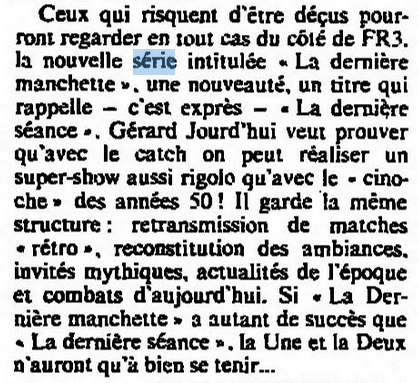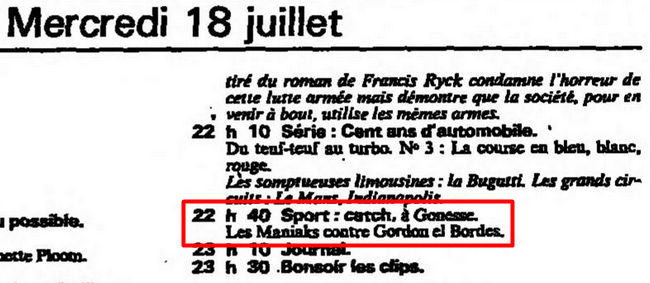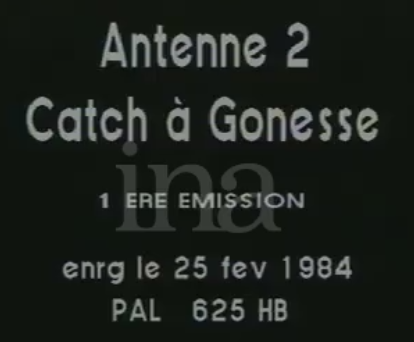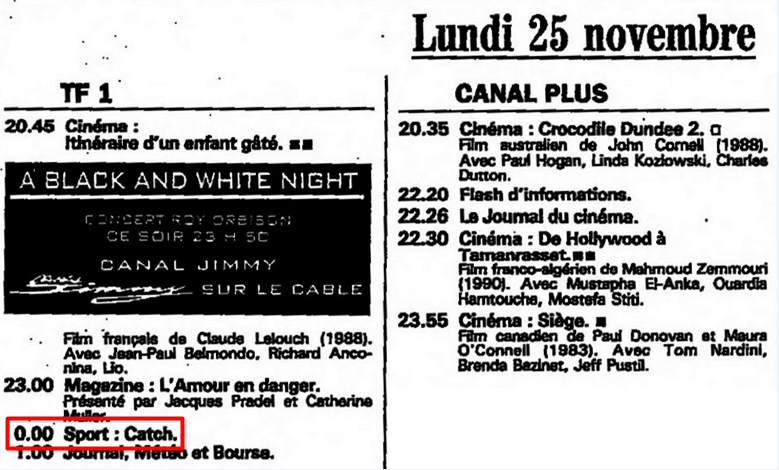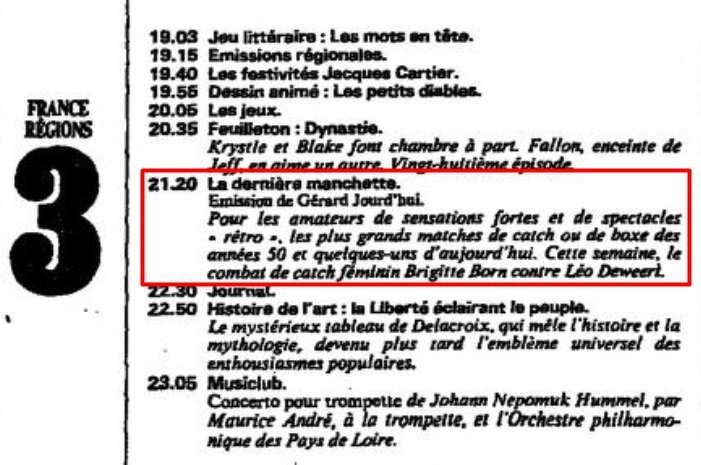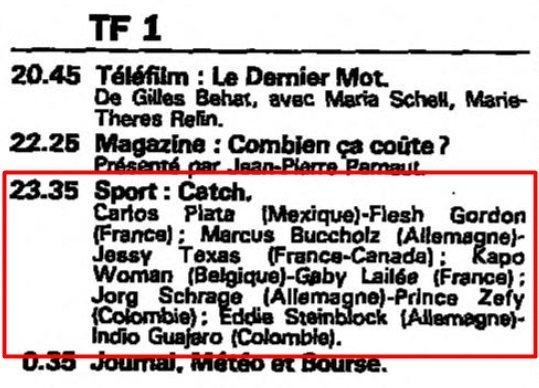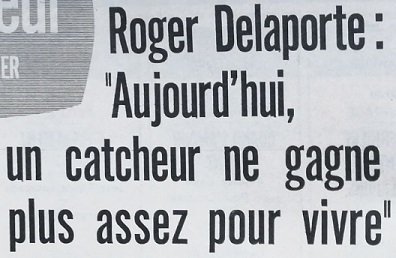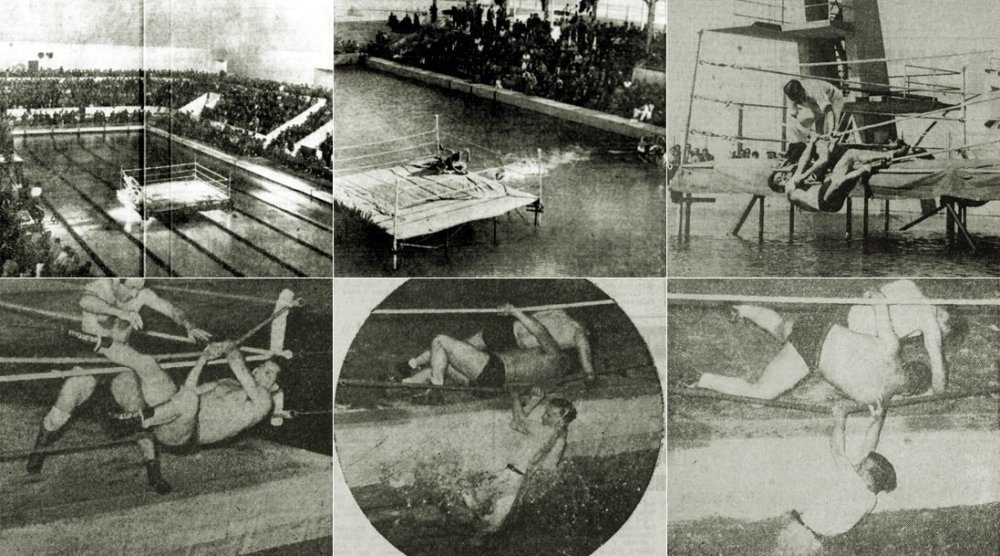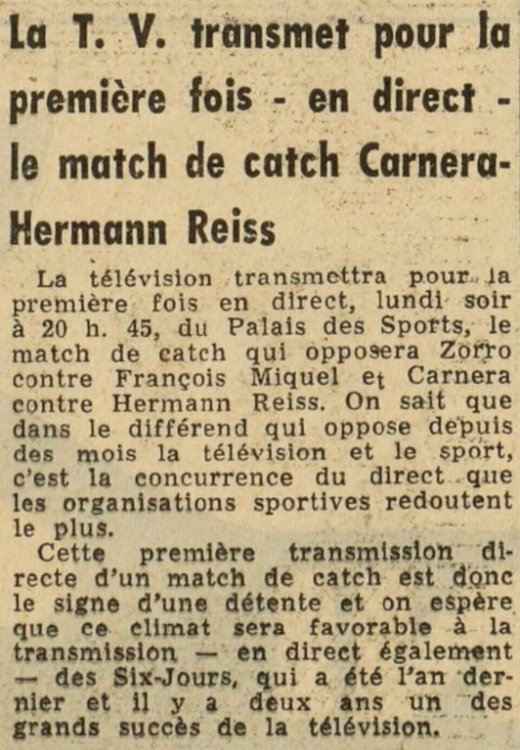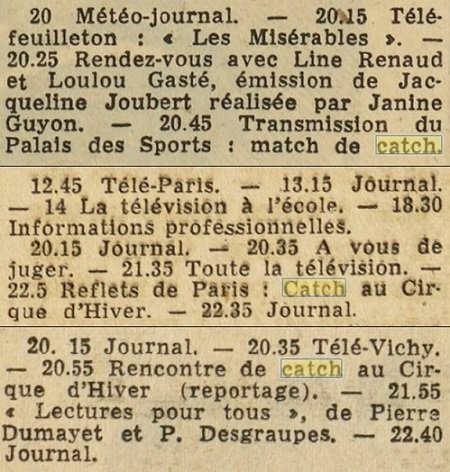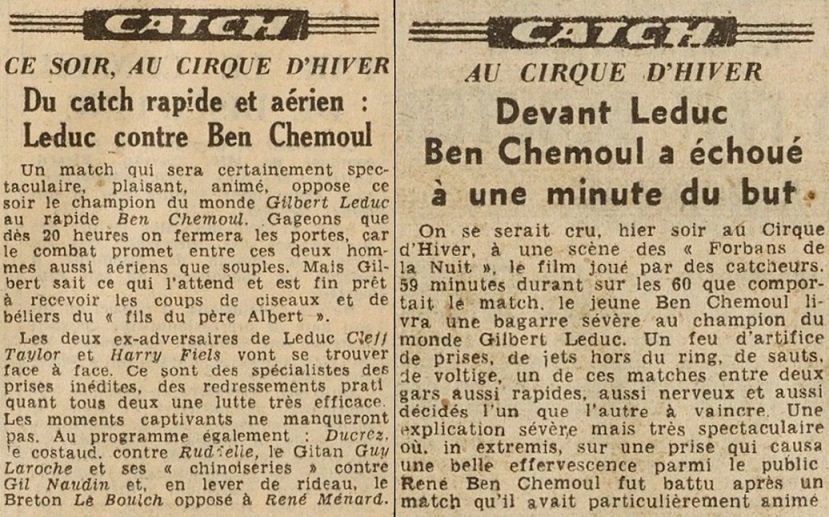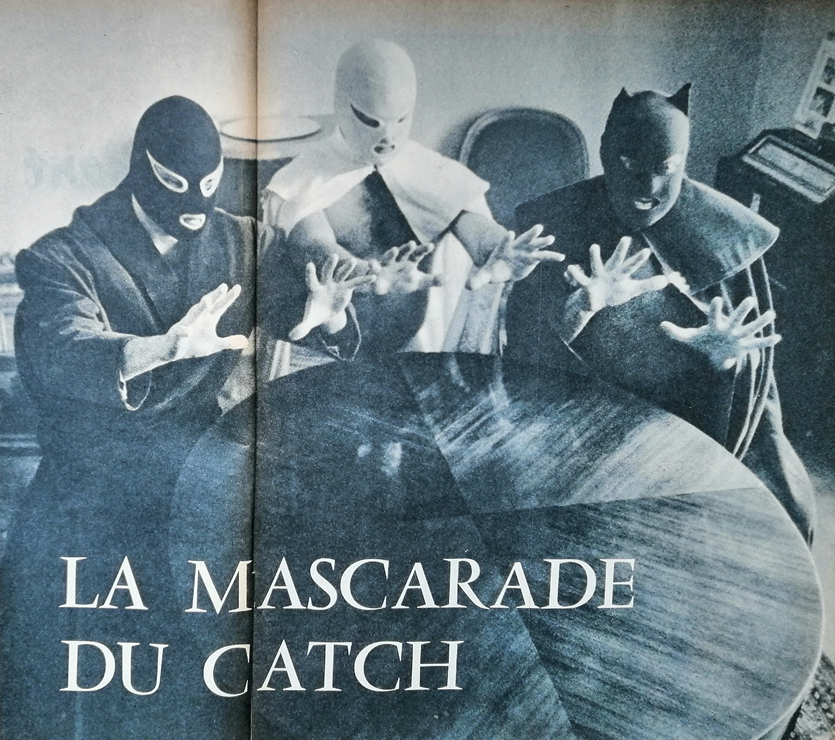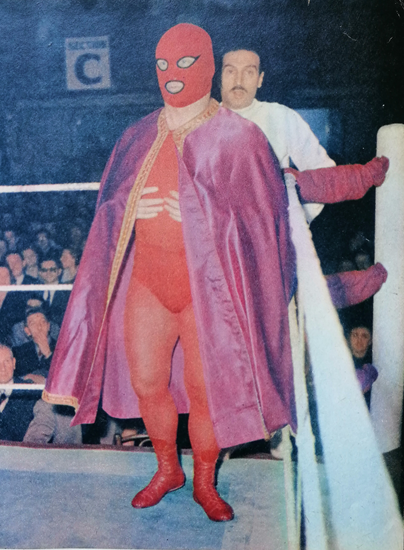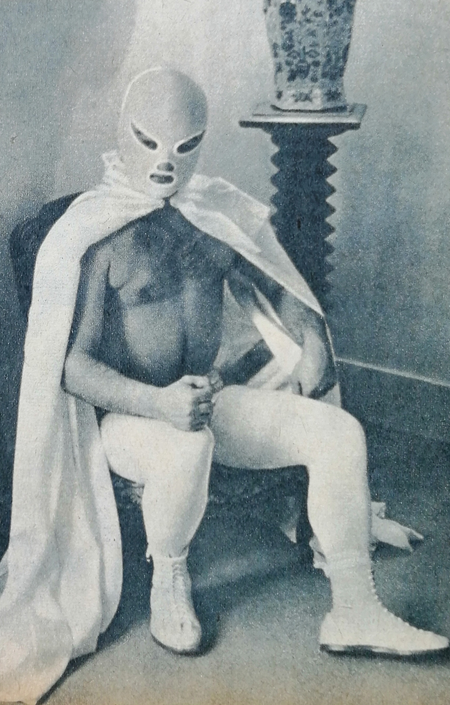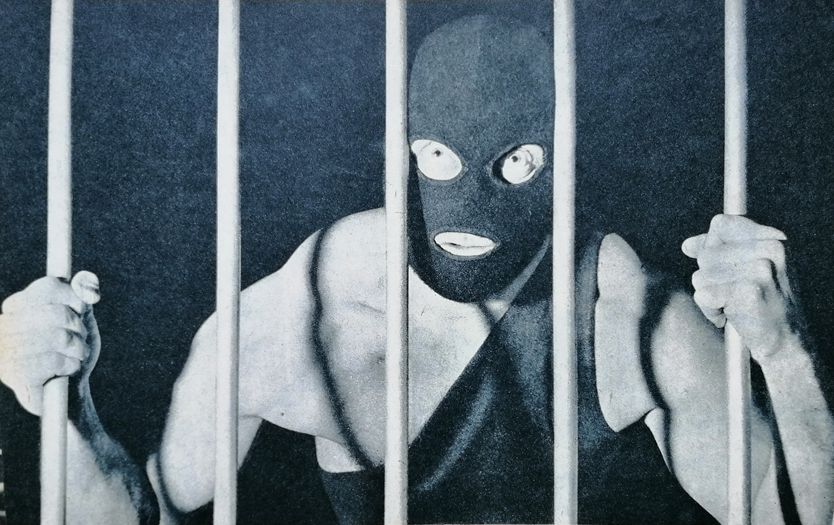Everything posted by Phil Lions
-
French catch
LDM was a series. It aired every week, except one, from July 21 until September 1, 1984. Then it was done. It was re-aired the following year on TV5. Here's an article talking about the debut of the series. Based on the TV listings, WWF started airing on Canal Plus in July 1985. Only for about six weeks though. Then it was off the channel and returned again in late December 1985.
-
French catch
Flesh had zero to do with it. The only reason for the slight increase in broadcasts (13 in total for the whole year) was La Derniere Manchette. A2 once again brought catch back (in this case Flesh and his guys) as filler summer programming for a few weeks, and at almost the exact same time FR3 decided to do the La Derniere Manchette show (which was a mix of retro matches, current day matches and some other stuff). Hence the increase in broadcasts. LDM on FR3 was airing in prime time on Saturdays around 9:20 pm and had a 70-minute time slot while the A2 shows were on Wednesdays around 10:30 pm and were slotted only for 30 minutes. Just finished looking into 1984 and it's good to point out some of INA's dates are actually the taping dates. For example, they have the Gordon/Bordes vs. Maniaks match listed as having aired on February 25, but it actually aired on July 18. February 25 was when it was taped and it even says so at the start of the footage (enregistré le 25 February / recorded on 25 February).
-
French catch
I've gone through the available French TV listings from 1974 to 1983 and in comparing those with what INA has it looks like INA's missing only about seven or eight TV matches altogether from the 1978-1983 period. Up to 1978 things are clearly on the decline for catch on TV, but still kind of alright with there being somewhat regular broadcasts (more than 10 per year, but less than 20). And then after 1978 and up to 1983 things get more dire and catch is airing on TV less than 10 times per year (and for half of those years the number is closer to 5 than it is to 10). There's also a clear pattern emerging where there'd be no catch on national TV for months, then A2 would bring it back as filler programming for a few weeks in the summer, and then there'd be no catch on TV again for months. This happened in 1980, 1982 and 1983. I know things are about to pick up a bit in 1984 though so at least there's that.
-
French catch
Just finished having a look through the TV listings in a 1975 newspaper* and I thought I'd compare with what INA has. At quick glance, I think a few of the matches are not available on @Matt D's channel. All the air times mentioned are pm. INA footage in bold. - March 8, 1975 (on TF1 at 10:30): no specific match advertised - April 13, 1975 (on A2 at 10:20): Al-Casi vs. Christian Preno + Daniel Schmid vs. Rocky James - May 11, 1975 (on A2 at 10:40): Eric Joly vs. Le Samurai + Daniel Schmid vs. Gilbert Wherle + Rene Ben Chemoul & Walter Bordes vs. Gerard Bouvet & Black Shadow** - May 24, 1975 (on TF1 at 10:45): a tag team match - June 13, 1975 (on A2): Gilbert Leduc & Jacky Corn vs. Der Henker & Le Samurai*** - June 19, 1975 (on A2 at 9:50 or 10:55 - conflicting info): from Cirque d’Hiver - June 28, 1975 (on TF1 at 10:25): no specific match advertised - July 13, 1975 (on A2 at 11:00): Gilbert Wherle & Daniel Boucard vs. Gass Dhoukan & Yanek Fryziuk - July 27, 1975 (on A2 at 10:45): no specific match advertised - September 7, 1975 (on A2 at 10:00): Iska Khan vs. Claude Jartel + Latif Salah vs. Daniel Boucard - September 14, 1975 (on A2 at 10:20): a tag team match - September 26, 1975 (on A2): Georges Cohen & Gass Doukhan vs. Pierre Payen & Daniel Boucard**** - October 12, 1975 (on A2 at 10:30): Yanek Fryziuk vs. Batistou - October 18, 1975 (on TF1 at 10:30): no specific match advertised - November 29, 1975 (on A2): Arpad Weber vs. Josef el Arz + Walter Bordes vs. Le Samurai***** * There are issues of the newspaper missing so the list of broadcasts may not be full. ** INA has the three matches as one video under that date, but the video is definitely two broadcasts posted as one. I think the Chemoul/Bordes tag is likely the May 24 broadcast, and it aired on A2, not on TF1 as advertised. *** Date could be wrong - the TV listings for that day don't mention catch. Could be the June 19 broadcast. **** Newspaper missing for that day. Can't check TV listings. ***** Catch was advertised for TF1 at 10:15 that night, but these matches clearly aired on A2 instead.
-
French catch
The date looks to be correct, technically. Catch was on at midnight (November 25th heading into 26th).
-
French catch
One more match to add to the list of aired matches that we're missing: Brigitte Borne vs. Leo Dewerdt (August 11, 1984). Speaking of "La derniere manchette", it lasted on France 3 for less than two months, and I just found TV listings confirming that the following year the episodes were re-aired on TV5. And here's a random TV listing for FEC/EWF on TF1 airing on a Monday night at 11:35 pm (November 11, 1991).
-
French catch
I have all of my research backed up so if something were to happen I'll just re-post it somewhere else. I don't know where, but somewhere.
-
French catch
I've just added the second part of my timeline on the history of French catch, covering the post-WWII period all the way to 1956. About 16-17 new pages of info. It's a long read, but it's all quite interesting, if I do say so myself. It's all here: https://bit.ly/FrenchCatchTimeline While the 1930s were a relatively peaceful era in French pro wrestling, the first half of the 1950s was most certainly not. It was a turbulent and interesting time with there being arguments about the curious phenomenon that was amateur catch, new federations being formed, new stars emerging, promotional wars going on, wrestlers and promotions switching sides, lawsuits being filed, the French state changing its stance on what catch was, television coming into the picture, tag team wrestling arriving amidst controversy and much more.
-
French catch
He doesn't outright say it, but I believe he meant French wrestlers specifically when he said that, because in the whole story he talks about French wrestlers only and later the story talks about the various jobs French wrestlers had taken on to make ends meet. That said, he is probably exaggerating a bit to make his point. Plus, there were plenty of, as Le Petit Prince used to refer to them with disdain back in the day, "Sunday wrestlers" too (i.e. semi-pro/local guys wrestling just as a hobby on the weekend), but there definitely weren't many proper French pros left by that point.
-
French catch
"Today, a wrestler doesn't earn enough to live" Came across an interesting story/interview with Roger Delaporte for one of the major French magazines in January 1977 where he laments the bad state of the business. Keep in mind, catch was still airing on TF1 at that point and I think later that same year it may have even been airing twice a week (on different networks), but despite this business was way down. Delaporte attributes it to a few factors: - Catch no longer airing live and instead typically on a delay of a few weeks, but the network wouldn't announce that it was pretaped. This allowed the network to plan their timing better and advertise in advance the exact time a show would end, which suggested to the public that all matches were fixed and therefore they lost interest. - Those taped shows would air mainly on Saturday night, which was a big night for catch live events, and having catch TV airing at the same time killed the live attendance. "We went from 5,000 spectators to 1,000 spectators. Even worse, one night I happened to be wrestling in a town and that same night a match I had wrestled in that town three months prior was airing on TV". - FFL (the amateur federation) no longer being in charge of catch led to "a multitude of bogus federations and a proliferation of promoters, resulting in total disorder." Multiple L'Ange Blancs, Bourreaus, Kamikazes... All sorts of guys now claiming to be World champion... - "In the past there were 300 wrestlers. Now there are barely 30 left. Simply put, catch shows are no longer profitable." - In the past there used to be tax exemptions for catch shows, this was no longer the case and now the promoters had to pay VAT. - Advertising in the press used to be free, now you had to pay for advertising in the newspapers. - Since July 1976 the state required wrestlers to be affiliated with Social Security and therefore money had to be deducted from the wrestlers' pay and the promoters' revenue to go to Social Security. And then the story makes it sound like Delaporte stopped promoting catch at Elysee-Montmartre in 1970 and he was to resume promoting now [1977]. It's not addressed in detail, but that is what the story suggests. There were definitely shows at Elysee in 1971-1976 so could it be that someone else was promoting there during that time (and Delaportre was simply leasing them the venue for the night)? I'm not sure, but this claim definitely peaked my interest. I'll try to find out more.
-
French catch
This is where I don't agree with your premise. There is no universal "they". The "they" in the 1960s were a completely different group of people than the "they" in the 1980s, and so was the TV landscape in general. Your premise is somewhat akin to saying that if Warner Bros. Discovery decided to cancel AEW tomorrow they'd base their handling of the cancellation on how AOL TimeWarner handled the WCW cancellation back in 2001. They won't. It's ancient history at this point. TV executives don't care about what happened 25 years ago to another group of executives. They only care about what is happening now and what will be happening going forward.
-
French catch
I don't think what was happening in the early 1960s has any connection whatsoever to what was happening in the 1980s. Completely different times with completely different people in charge. I highly doubt anyone remembered what had happened in the 1960s, let alone was basing any decisions on stuff that had happened in the 1960s. In the 1960s whenever catch got taken off TV the public would demand it back. By the 1980s I don't think the public cared that much, if at all, so I doubt the networks felt any pressure whatsoever about cancelling catch or gave it that much thought.
-
French catch
Yep. I just finally managed to get my hands on that magazine (the one with Delaporte on the cover), along with some other stuff from around the same time, and this is how I managed to piece everything together.
-
French catch
Here's a fun fact that I've been reading more about these past couple of days: this match got catch taken off TV. Not because of anything that happened in it, but because of the political ramifications of it. Here's what happened. First of all, just as a reminder, RTF's original agreement was with the four major promotions based out of Paris, which were to share the air time on the network. In early 1960 Jean Fryziuk, frustrated with the direction the business was headed in at the time (in his own words, too many masked gimmicks and too much clowning around), created his own promotion. Initially it was a small "indie" promotion with only a handful of affiliated wrestlers so despite now having his own company Fryziuk did continue taking some dates for the big promotions here and there too. In 1961, in the wake of L'Ange Blanc deciding to unmask and in the fallout from that, a bunch of guys left the Goldstein promotion, most importantly Goldstein's top mechants - Delaporte and Bollet. This was also when allegiances shifted a bit in the world of French catch as the Lageat/Siry promotion left the Goldstein/Chausson camp and joined up with Durand. After leaving Goldstein and up to the spring of 1962 Delaporte and Bollet were working for the Lageat/Siry/Durand group and then they, along with some others, joined forces with Fryziuk's promotion and tried to position that as the third major group. The name of the governing body for the promotion was Fédération Française de Lutte et de Catch Autonome (FFLCA). So when RTF decided to air the Delaporte vs. Fryziuk match, a FFLCA match, the other promoters raised a big fuss about this. Phone calls, threats, insults... The relationship of the promoters with RTF was already strained anyway, but this put things over the top. Roger Couderc, who had done the commentary for the Delaporte/Fryziuk match, announced that he's quitting catch commentary because of how much grief the promoters had been giving him and in general he was tired of dealing with their BS. Also, and more importantly, the head of sports at RTF Raymond Marcillac petitioned the head of the network to remove catch from the sports department of the network (his department) and put it in the hands of the entertainment department so that he didn't have to deal with the promoters anymore. He was tired of all the drama that came with dealing with the promoters and wanted nothing to do with them anymore. As a result catch was now off TV. Catch did return to TV later in 1962, but then got taken off TV again in 1963 only to be brought back in October 1963 when the promoters finally came to an agreement amongst themselves. So, in case you want to keep score: catch got taken off TV for a while on three separate occasions in the early 1960s (1961, 1962 and 1963). And just as a side note, here's where things stood in mid 1962 in terms of talent: - Goldstein/Chausson group: Voiney, Simunovich, Duranton, Hi Lee, Chemoul, Gueret, Amor, Said, Dula, Montreal, etc. - Lageat/Siry/Durand group: L'Ange, Bourreau, Leduc, Lasartesse, Gastel, Brown, Montourcy, Corn, Kamikaze, Laroche, etc. - FFLCA: Delaporte, Bollet, Fryziuk, Di Santo, Zarzecki, Calderon, Straub, Robert, etc.
-
French catch
@David Mantell The origins of the swimming pool matches. So, I've looked into it a bit and here's what I can confirm. As mentioned before, the earliest one that I can find is from September 1948 in Bordeaux, and INA has highlights of it, but it seems like the concept started picking up more steam in 1954 when the business as a whole became looser in terms of regulations (that's another story for another day). At that point the swimming pool matches were exclusively an "indie" concept, as in the major promotions had nothing to do with it. The main promotion, and perhaps even the only one, that was doing such matches at the time was CIC (Cercle International de Catch) and for a few years its shows were under the regulations of the FACA (Federation Autonome de Catch Amateur) governing body. Both were based out of Bordeaux. In addition to Bordeaux, CIC did shows in other French towns and eventually in the French territories in Africa too. CIC started as an "amateur catch" organization in 1947 (amateur catch is a big story in itself, a story for another day), but eventually when "amateur catch" faded away as a concept in France, CIC became a pro organization and worked with Lageat and Siry's FFCP and later on with others too. In 1947-1954 CIC had its own set of stars and champions (French, European and World), some of them being Yves Borne, Rene Mathieu, Manuel Cubera, Juan Pascual, James Bellivers, Dante Pozzi, etc. Most, if not all, of CIC's wrestlers were lightweights, welterweights and middleweights. Photos from 1954 in Bordeaux, Casablanca and Algiers:
-
French catch
^ And continuing that train of thought, I just found the following clipping from "Tele Magazine" (i.e. the French equivalent of "TV Guide" back then) confirming exactly how many catch broadcasts there were between 29 September 1956 and 31 August 1957. The point is, based on this, INA is missing 6 broadcasts from the last three months of 1956 and only 2 broadcasts from the next 8 months (we have 27, and there were 29). It's also interesting to note the magazine had an annual reader poll where they would ask the readers what they watched on TV, what changes they would like to see, etc. And according to their 1957 poll, 80% of the voters said they watch catch.
-
French catch
I've finished looking into 1954 and I can confirm the following. 1954 was the start of the catch broadcasts, but it appears there were only three broadcasts that year, all three by the Paoli-Goldstein promotion: - March 22 (from Palais des Sport) - Primo Carnera vs. Hermann Reiss + Francois Miquet vs. The Great Zorro - May 21 (from Cirque d'Hiver) - August 5 (from Cirque d'Hiver) INA doesn't have any of the footage. It's not clear what aired on the latter two broadcasts, but these were the cards of the live events that night (main event listed first): - May 21: Rene Ben Chemoul vs. Claude Montourcy... Charlie Fisher vs. Roger Guettier... Guy Laroche vs. Joachim La Barba... Roger Laroche vs. Albert Albisson... Gaby Dumas vs. Guebedjian - August 5: Charlie Fisher vs. Jean Casi... Bolo Hakawa vs. Marcel Manuel... Roger Delaporte vs. Guy Laroche... Moise Besch vs. Paul Roche... Fred Bauer vs. Andre Mouton It's interesting to note that the very first broadcast on March 22 happened because the creator of the popular variety TV show "36 chandelles" Jean Nohain got into a dispute with the network and as a result there ended up being a last-minute deal struck to air catch instead of the regularly scheduled "36 chandelles". A lot of the newspaper articles that I saw were very negative on catch because it replaced a beloved show, but apparently the viewing audience loved it and flooded the station with letters asking for more catch broadcasts on TV. Keep in mind though, at the time the promoters were apprehensive about having their shows air live on TV and there was fear that TV broadcasts would hurt the gates (not only of the broadcast show itself but of the other live events happening at the same time elsewhere in the territory). And that is a big reason why it took a while for the broadcasts to become more regular. I also found this interesting. There's a 16-minute women's wrestling segment from May 1954 that was produced for TV and INA still has the footage, but according to their records it was not aired on TV. It's a swimming pool women's tag team match. Could be the one I mentioned earlier or another one with the same women. It's not produced like typical catch though. There's 6 minutes of pre-match footage of the women arriving in France via airplane, then driving about and finally doing some training. The match itself is also shot differently with a lot of close-up shots and comedy. It ends with the referee being dumped in the swimming pool.
-
French catch
Turns out, that was wrong. INA has short highlights from a singles men's match from Bordeaux in September 1948. It's the same type of match, but in this case it's referred to as "catch nautique". Link to the footage: https://www.facebook.com/watch/?v=1196359814810027 ------ And while I'm on the topic of different types of catch, lately I've been looking into "catch amateur", which is a fascinating piece of French pro wrestling history that has been completely forgotten about. Long story short, they started doing it in the late 1940s and it quickly overtook pro wrestling (catch) as the most common type of catch in France as in by the looks of it there were more amateur catch events taking place than there were pro catch events (for example, in Paris there were typically 4 or 5 amateur catch events per week vs. 2 or 3 pro events). So what was this amateur catch? Well, it was presented as an amateur sport, an amateur version of the pro catch (with some minor rule differences), but it was 100% pro wrestling. Tons of future pro wrestlers did it. Heck, even active pro wrestlers like George Kidd and Mick McManus popped in for some amateur catch. Look no further than this video from an amateur catch match that I shared yesterday on Twitter as proof that it was pro wrestling despite not being billed as such: Joachim la Barba vs. Rene Bouchoucha in 1952 So why present it as amateur instead of pro, which it clearly was? Because by calling it amateur they were able to save millions of francs on taxes as amateur events didn't have to pay the taxes that the pro events had to pay. And as you can imagine the French authorities eventually figured this out and lawsuits and fines followed. And that's not even half of it. Amateur catch had a big role in the first major promotional war in French pro wrestling breaking out. Anyway, I'll discuss this in more detail in my French catch timeline. French pro wrestling history in seriously fascinating. There's a lot of unique twists and turns in it that are unlike anywhere else in the world. The more I dig, the more I become fascinated by it.
-
French catch
Came across an article from January 1950 where several French celebrities talk about why they like catch while also commenting about whether or not the catch matches were predetermined. I thought that's quite neat so I'll share here what they said. Albert Préjean (actor): "You can say what you want about catch, but... it's a sport. Besides, about tricks, I don't think there are as many as people say. For example, I had a friend who performed a hand-to-hand act. He was also a wrestler in his spare time. While performing his act, he never got hurt. While wrestling, he broke his nose. Breaking your nose is not a show, after all. I think the public goes to see the lightweight matches because of the spectacular appeal of these encounters, and the heavyweight matches for sadism. They always hope that one of the two wrestlers will get their head torn off..." Milly Mathis (actress): "What I am trying to understand is how, after having wrestled for an hour on the mat, the two wrestlers manage to find all their limbs. They must be flexible, it leaves me speechless to see such big gentlemen twisting and undoing themselves like that... As for knowing whether it is fake or not, that is their business..." Marcel Achard (author): "It's very good theater, although in my opinion they are not all rigged. I acquired a taste for catch during my stay in the United States. I saw a certain Jim Londos wrestle there, who must have been the world champion. What a guy! His great hobby was to throw his opponent over the ropes. And not in the front row. Up to the fifth or sixth. I never sat there..." Alfred Adam (actor): "I'm not looking for the same pleasure in catch as in boxing. Boxing is a dark, dramatic thing. Sometimes dirty. Catch is the opposite. What actors these wrestlers are. What an art to portray suffering, anger, fear... For me, the audience of catch today is the one who, fifty years ago, was passionate about melodrama. I don't mean by that that catch is just bluff. I believe that in the end it's the best who wins. In any case, we would be wrong to underestimate the athletic value of the matches." Francis Lopez (composer): "It reminds me of my job. Because between us it's great music, and well orchestrated..." That same article mentions that they had recently done a survey asking people whether they thought the catch matches were real and according to their poll 75% of the spectators were convinced of the sincerity, if not of all the matches, at least of the most important ones.
-
French catch
It wasn't televised, but man does this sound like something I wish we could watch. February 9, 1951. A young Gilbert Leduc wrestled a young Rene Ben Chemoul for 59 minutes in Paris. "A fireworks display of holds, throws out of the ring, jumps, and acrobatics" is how the report on the right described it.
-
French catch
Earlier today the 1954 French newspapers were put online (under French copyright law 70 years since the date of publication need to have passed for the papers to be made publicly available online) and that has now allowed me to finally answer the question: when did catch first air on TV in France? As mentioned before, catch highlights started airing as part of the TV news in 1949, but the first actual broadcast was on March 22, 1954, from Palais des Sport (i.e. the Paoli-Goldstein promotion). That night Primo Carnera vs. Hermann Reiss and Francois Miquet vs. The Great Zorro (Hans Mortier) aired live on TV at 8:45 pm. Claude Darget did the commentary. This broadcast was just a one-off, I believe. I've yet to research 1954 more thoroughly, but for now it seems like this was the only broadcast that year. On another fun note, I haven't looked much into it, but according to this one article I saw the first ever "catch aquatique" match in France took place on May 8, 1954, in Saint-Germain-en-Laye. It was a women's tag team match with the ring in the middle of a big pool.
-
French catch
I haven't decided yet. I have about 160 pages worth of notes, articles, etc. and I'm still going through them trying to piece together the whole timeline and make it as coherent as possible. Plus, I'm also still looking into gathering additional information on top of that and trying to fill in some of the gaps. Most likely I'll end it at the end of the 1980s. And I don't see myself going into much detail past the mid 1960s. Not because I don't want to, but because I don't have enough info.
-
French catch
Yes, it was them and actually this is a very good point that I didn't think to add to my write-up. I'll add some extra details now. Thanks!
-
French catch
And here it is. Part one of the catch timeline that I've been working on. It goes up to 1940 when all pro wrestling was banned in France. There will be a part two eventually which will cover the post-WWII period. Link: Timeline - French catch
-
French catch
Just came across these and I thought I'd share them here. Tony Oliver as Le Justicier Blanc (Maurice Durand's L'Ange Blanc ripoff): A few masked characters from the Durand promotion (April 1959): Superman, Le Justicier Blanc and El Diablo. Le Bourreau de Bethune in color: And finally, I love this one of L'Homme Masque (The Great Zorro/Hans Mortier, I assume):
